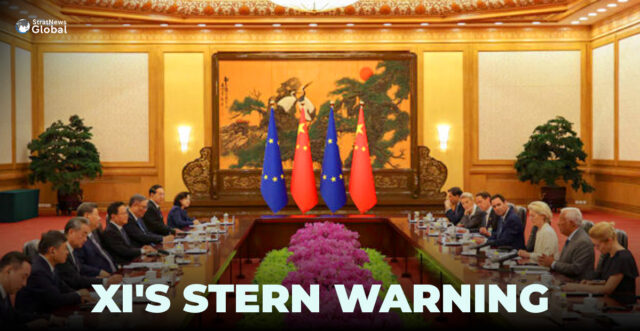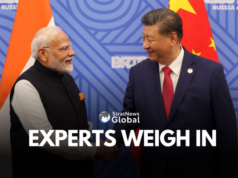In a significant diplomatic message, Chinese President Xi Jinping on Thursday urged top European Union leaders to “make correct strategic choices”, according to state media, during a crucial summit in Beijing expected to focus on contentious issues such as trade tensions and the Ukraine conflict.
Expectations were low for the summit marking 50 years of diplomatic ties after weeks of escalating tension and wrangling over its format, with the duration abruptly halved to a single day at Beijing’s request.
Issues of trade imbalance, market access and rare earths are on the agenda as Xi and Premier Li Qiang meet visitors Ursula von der Leyen, the president of the European Union Commission, and Antonio Costa, the European Council president.
‘Mutually Beneficial Cooperation’
“The more severe and complex the international situation, the more China and the EU must strengthen communication, enhance mutual trust and deepen cooperation,” Xi told von der Leyen and Costa, state broadcaster CCTV said.
“Chinese and European leaders should … make correct strategic choices that meet the expectations of the people,” he added.
The weeks leading up to the summit had been dominated by tit-for-tat trade disputes and hawkish rhetoric from European officials.
Shortly before the summit, von der Leyen struck a more conciliatory tone, calling it an opportunity to “both advance and rebalance our relationship” in a post on X on Thursday.
“I’m convinced there can be a mutually beneficial cooperation,” von der Leyen added.
‘Critical Partner To Europe’
State news agency Xinhua also appeared to downplay Beijing’s rivalry with the 27-member bloc, saying China was a “critical partner” for Europe, with a range of shared interests.
“China is a critical partner to Europe, not a systemic rival,” it said in a commentary on Thursday.
The two shared interests in trade, climate, and global governance, it said, adding, “These areas of common ground should not be eclipsed by isolated points of friction.”
‘Systemic Rival’
The EU defines China as a “partner, competitor and systemic rival”, which frames its strategic approach to China policy.
At the summit, European leaders are also expected to raise topics such as electric vehicles and Chinese industrial overcapacity.
China launched rare earth export controls in April that disrupted supply chains worldwide, leading to temporary stoppages in European automotive production lines the following month.
But its exports of rare earth magnets to the EU surged in June by 245% from May, to stand at 1,364 metric tons, though that was still 35% lower than the year-earlier figure, customs data showed.
The EU is likely to seal a trade deal with the United States for a broad tariff of 15% on its exports after intense negotiations, avoiding a harsher 30% figure threatened by President Donald Trump.
(With inputs from Reuters)





